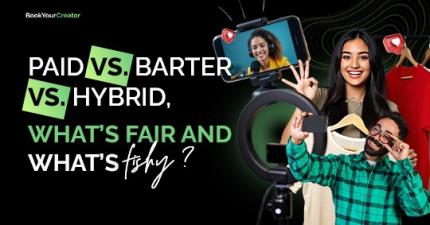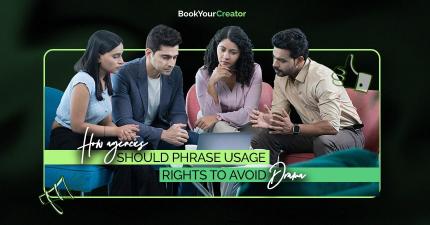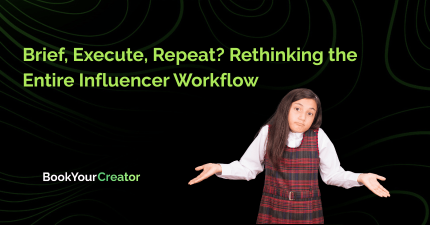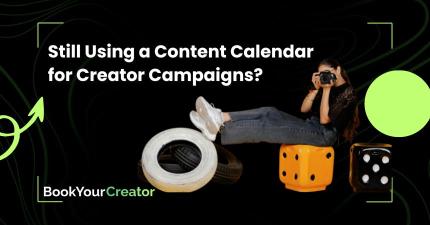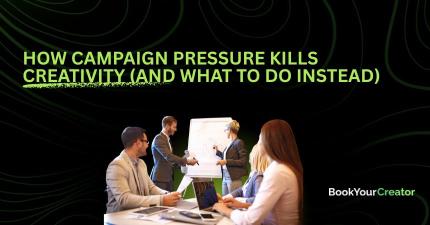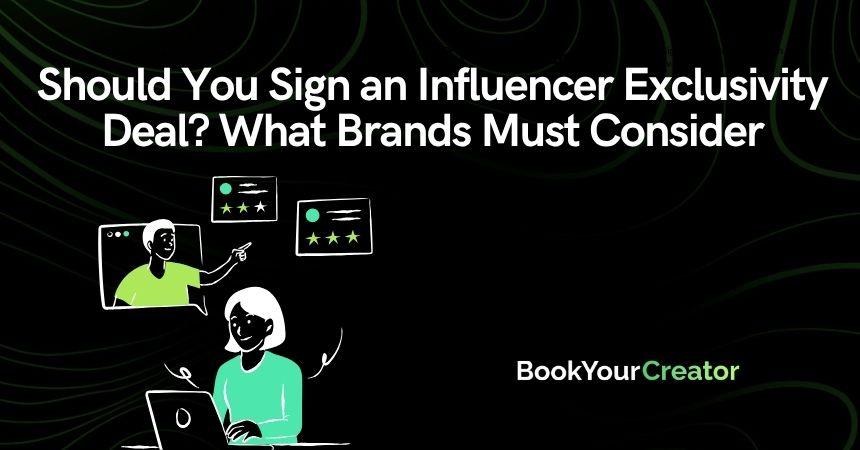
- 30 Jun, 2025
Should You Sign an Influencer Exclusivity Deal? What Brands Must Consider
You wouldn’t ask someone to commit to you after just one good conversation. So why do brands expect that from creators?
Exclusivity sounds great in theory. A creator who aligns perfectly with your brand, commits fully, and can’t promote your competitors? Sounds like a win.
But in reality, exclusivity deals are more nuanced, and if you’re not careful, they can limit your campaign’s impact or push great creators away.
Let’s unpack what exclusivity actually means in influencer marketing today, and what both brands and creators should consider before saying yes.
First, What Is an Influencer Exclusivity Deal?
An exclusivity deal is a clause that prevents a creator from promoting competing brands, usually in the same category,for a set period of time.
Example:
If a skincare brand works with an influencer, they might add a clause that bans the creator from promoting any other skincare product for 30 days before and after the campaign.
These clauses vary:
Category-based: Only blocks certain verticals (e.g., tech, fitness, food)
Platform-based: Applies to Instagram only, or across all social media
Time-based: Could cover just the campaign window, or stretch months before/after
Sounds simple? It rarely is.
Why Brands Consider Exclusivity
Cleaner Messaging
You want your campaign to feel authentic. If a creator promotes you today and your rival tomorrow, the audience stops trusting both.Category Leadership
In competitive categories, like beauty, fashion, or wellness, exclusivity can help you stand out and protect your share of voice.Long-Term Storytelling
With exclusivity, you can plan more layered campaigns: multiple reels, unboxings, even creator-led IPs. You’re not just one of many, you’re the only one.
But Here's What Often Goes Wrong
Exclusivity Isn’t Free
Creators lose income when they turn down other deals. Unless you're offering better value, higher pay, longer-term scope, or performance bonuses, it’s unfair.It Reduces Flexibility
If the creator’s content doesn’t perform well, you’re locked in. And they’re locked out of better-aligned campaigns. Nobody wins.Creative Fatigue Is Real
Creators need freedom to explore different formats, ideas, and brands. If they feel restricted, their creativity (and your campaign) suffers.
What Creators Should Ask Before Signing
Exclusivity isn’t bad, but unclear or unpaid exclusivity? Huge red flag.
Here’s what creators should clarify before they agree:
What exactly is off-limits? Just haircare? Or all beauty brands?
For how long? 7 days, 30 days, 90?
On which platforms? Instagram only? What about YouTube?
What’s the value exchange? Am I getting fairly paid for what I’m giving up?
Industry Reference: This Isn’t Just a Creator Concern
According to Influencer Marketing Hub’s 2024 Benchmark Report, 41% of creators said they’ve declined paid campaigns that included vague or unpaid exclusivity clauses.
This shows a clear trend: creators are being more selective, and brands need to be smarter with how they negotiate.
Smarter Alternatives to Blanket Exclusivity
Instead of broad bans, many brands are now offering:
Narrow category locks – e.g., “no competing kombucha brands,” not “no F&B at all”
Platform-based restrictions – e.g., exclusive to Instagram, but free on YouTube or Threads
Short-term windows – e.g., 10 days post-campaign, instead of 90
Performance-linked clauses – exclusivity extensions tied to results
These give brands control, without boxing creators in too much.
Quick Recap
Brands Should Ask | Creators Should Ask |
Do we need full exclusivity, or just clarity? | What’s the exact scope—category, time, and platform? |
Are we offering enough value for what we’re asking? | Am I being fairly paid for what I’m giving up? |
Can we build a tiered or limited clause instead? | Can I negotiate scope or reduce the duration? |
How BookYourCreator Can Help
At BookYourCreator, we’ve helped hundreds of brands and agencies navigate influencer partnerships, with real clarity and zero chaos.
Here’s how we handle exclusivity smartly:
We pre-negotiate terms with creators, so brands don’t have to worry about the awkward parts.
We ensure every exclusivity clause is clear, fair, and aligned with campaign goals.
We help creators and agencies find the middle path, so everyone wins.
No vague contracts. No unrealistic demands. Just smoother, smarter, creator-brand collabs.
Exclusivity only works when both sides feel valued.
And that’s exactly what we do at BYC.
Want to run better campaigns with better terms?
We’re ready when you are.
